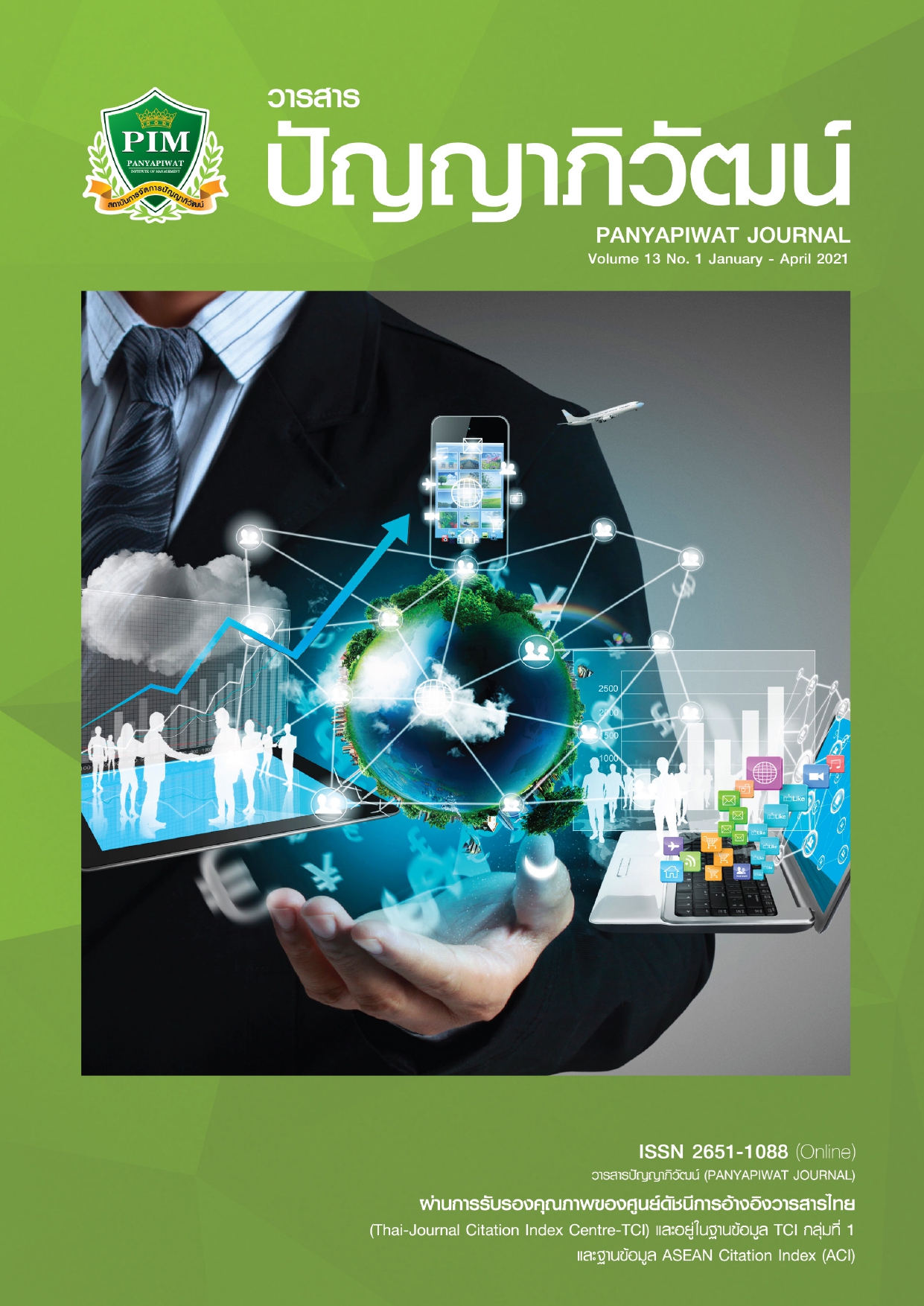การเสริมสร้างสมรรถนะของผู้เรียนโดยใช้การเรียนรู้ในรูปแบบ Work-based Education
Main Article Content
บทคัดย่อ
การจัดการเรียนรู้ในรูปแบบการเรียนรู้ที่มีฐานจากการทำางาน หรือ Work-based Education เป็นหนึ่งในรูปแบบการจัดการเรียนรู้ที่มุ่งเน้นกระบวนการให้ผู้เรียนได้เรียนรู้ในชั้นเรียนและได้ประสบการณ์จากการทำงานจริง ความโดดเด่นของรูปแบบนี้คือ หลักสูตรสาขาวิชาสามารถออกแบบและปรับเปลี่ยนกระบวนการ ดำเนินงานให้เหมาะสมกับบริบทสายงานอาชีพ ภายใต้หลักการที่เสริมสร้างทักษะการใช้ชีวิตและทักษะ การทำงานให้ผู้เรียนสามารถบูรณาการองค์ความรู้ภาคทฤษฎีที่ได้ในห้องเรียนกับการทำางานในองค์กรต่างๆ ได้อย่างมีความสุข การศึกษาเกี่ยวกับรูปแบบการจัดการเรียนรู้แบบ Work-based Education นี้เป็นการศึกษาความหมายและลักษณะของรูปแบบ หลักการแนวคิดพื้นฐาน องค์ประกอบ ประโยชน์ และความสัมพันธ์ของสถาบันการศึกษา สถานประกอบการและสังคม ซึ่งเป็นองค์ประกอบสำาคัญในการจัดการเรียนรู้ในรูปแบบWork-based Education ที่เชื่อมโยงไปสู่การเสริมศักยภาพผู้เรียนให้เหนือกว่าการเรียนในห้องเรียนเพียงอย่างเดียว การสร้างโอกาสในการฝึกประสบการณ์การทำางานในสถานประกอบการให้ผู้เรียนได้มากกว่า 1 ครั้ง ภายในระยะเวลาการเรียนการสอนที่แต่ละหลักสูตรกำาหนด บทความนี้รวบรวมข้อมูลจากเอกสารสิ่งพิมพ์สื่อออนไลน์และงานวิจัยที่เกี่ยวข้องทั้งในและต่างประเทศ เพื่อหาแนวทางให้ผู้เกี่ยวข้องทุกฝ่ายนำารูปแบบ Work-based Education เป็นฐานในการออกแบบประสบการณ์การเรียนรู้ให้ผู้เรียนมีคุณภาพตามสมรรถนะการเรียนรู้ในศตวรรษที่ 21 รอบด้านทั้งทักษะอาชีพ ทักษะสังคมและทักษะชีวิตให้เกิดประโยชน์สูงสุด
Article Details
“ข้าพเจ้าและผู้เขียนร่วม (ถ้ามี) ขอรับรองว่า บทความที่เสนอมานี้ยังไม่เคยได้รับการตีพิมพ์และไม่ได้อยู่ระหว่างกระบวนการพิจารณาลงตีพิมพ์ในวารสารหรือแหล่งเผยแพร่อื่นใด ข้าพเจ้าและผู้เขียนร่วมยอมรับหลักเกณฑ์การพิจารณาต้นฉบับ ทั้งยินยอมให้กองบรรณาธิการมีสิทธิ์พิจารณาและตรวจแก้ต้นฉบับได้ตามที่เห็นสมควร พร้อมนี้ขอมอบลิขสิทธิ์บทความที่ได้รับการตีพิมพ์ให้แก่สถาบันการจัดการปัญญาภิวัฒน์หากมีการฟ้องร้องเรื่องการละเมิดลิขสิทธิ์เกี่ยวกับภาพ กราฟ ข้อความส่วนใดส่วนหนึ่งและ/หรือข้อคิดเห็นที่ปรากฏในบทความข้าพเจ้าและผู้เขียนร่วมยินยอมรับผิดชอบแต่เพียงฝ่ายเดียว”
เอกสารอ้างอิง
Chinintorn, P. (2010). Integrated Learning and Working (Work-integrated Learning: WIL) in Education Institute in Thailand. Retrieved June 28, 2020, from http://www.southeast.ac.th/2017/wp-content/uploads/F_sat/research/003.pdf [In Thai]
Kasemsuk, J. (2016). Work-based Education: 3S Faculty of Communication Arts, Panyapiwat Institute of Management. Retrieved July 25, 2020, from https://ca.pim.ac.th/uploads/content/2016/05/o_1ak09g9sjtuv1err1f891l8d3spa.pdf
Khemmani, T. (2012). Science of Teaching, Knowledge for Learning Management Proficiency. Bangkok: Chulalongkorn University Press.
Kramer, M. & Usher, A. (2011). Work-integrated Learning and Career-ready Students: Examining the Evidence. Retrieved July 30, 2020, from https://higheredstrategy.com/wp-content/uploads/2011/11/InsightBrief5-FINAL-1.pdf
Manarungsan, S. (2015). Education in Style of PIM Work-based Education. Retrieved July 19, 2020, from https://www.pim.ac.th/th/news/446/pim-work-based-education.html
Office of the Education Council. (2017). National Education Plan B.E. 2560-2579. Bangkok: Prigwhan Graphics. [in Thai]
Office of the National Education Commission. (2010). National Education Act B.E.2542 as amended (No.2) B.E. 2545 and (No.3) B.E. 2553. Retrieved July 20, 2020, from https://person.mwit.ac.th/01-Statutes/NationalEducation.pdf
Patcharinthanakun, P. (2019). University is Not Just for Teaching, but also Improving Human. Baw Bann CPE-News, 11(September-October), 8-9. [in Thai]
Stirling, A., Kerr, G., Banwell, J. MacPherson, E., & Heron, A. (2014). A Practical Guide for WorkIntegrated Learning: Effective Practices to Enhance the Educational Quality of Structured Work Experiences Offered Through Colleges and Universities. Retrieved July 30, 2020, from https://www.vu.edu.au/sites/default/files/CCLT/pdfs/heqco-practical-guide-wil.pdf
Suthamanon, L. (2017). Panyapiwat Institute of Manage and Model of Work-based Education. Office of the Higher Education Commission. Retrieved July 19, 2020, from http://www.mua.go.th/users/he-commission/t-visit%20project/t-visit%20book%202/22--g2--15-1.pdf


